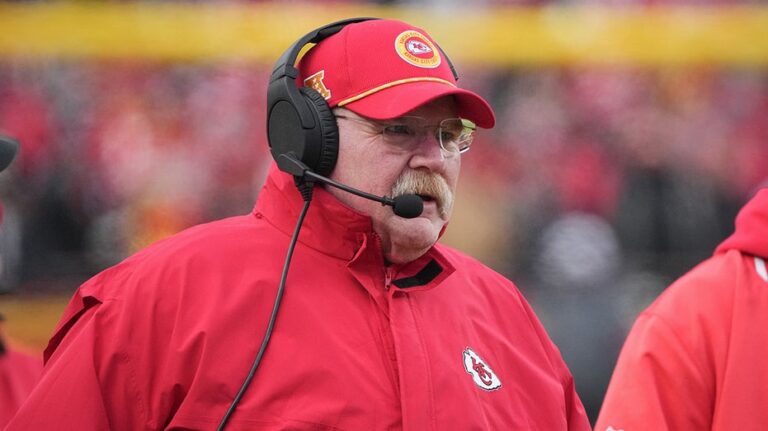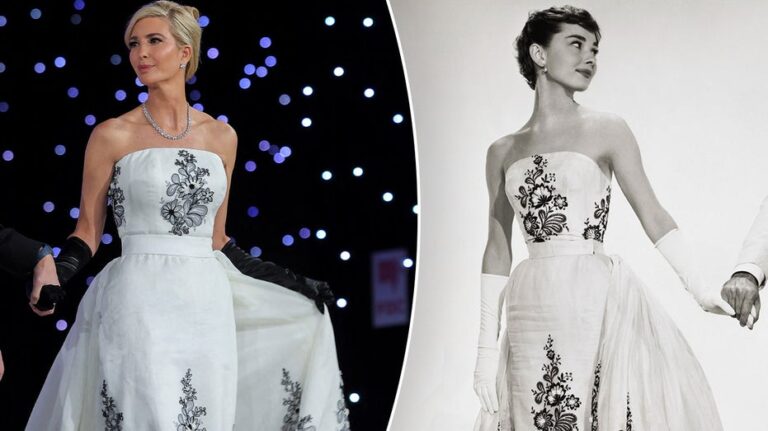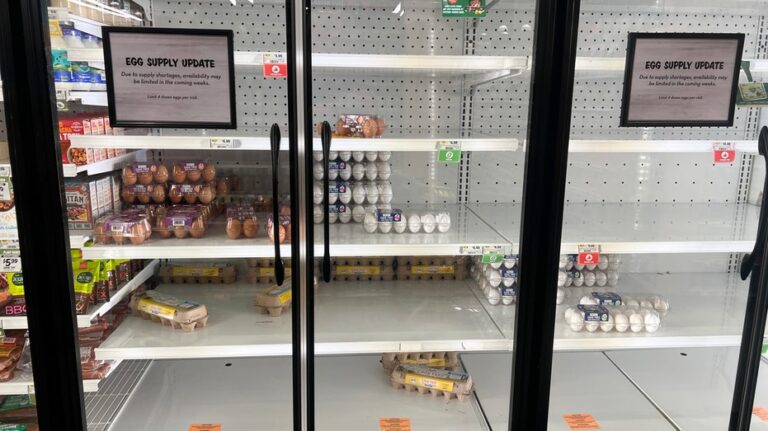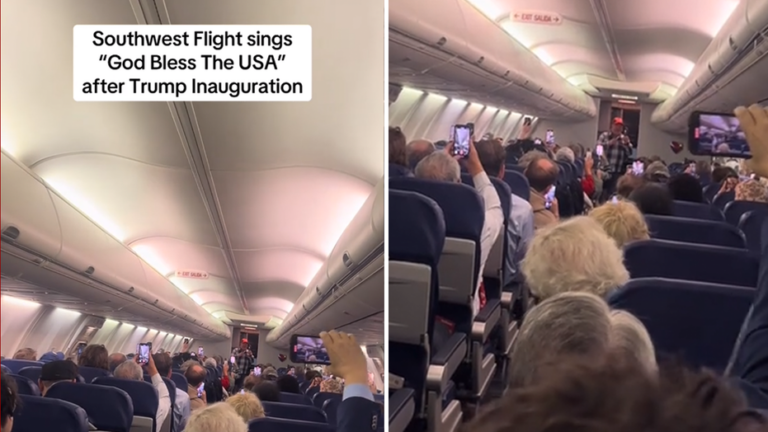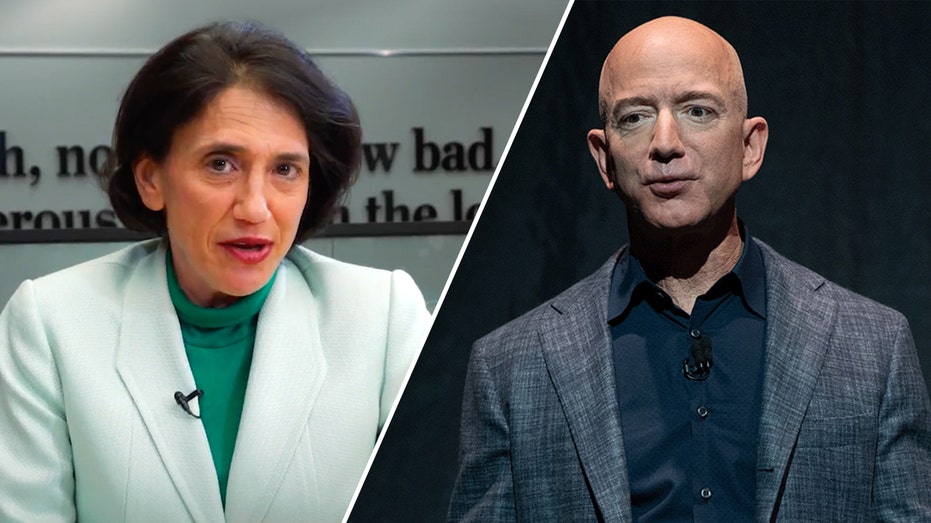
Washington Post columnist Jennifer Rubin had some harsh words for her paper’s billionaire owner Jeff Bezos over his “bulls— explanation” behind the non-endorsement in the 2024 presidential race.
“First of all, I do not believe the reason stated. I don’t believe they have suddenly decided – he has suddenly decided that we should endorse everybody except presidential candidates, and that of all the elections, this is the one to start with this new policy,” Rubin began Tuesday’s installment of “Jen Rubin’s Green Room” podcast. “We endorsed a presidential candidate in 2020 no problem. And I perceive this, and even if it’s not intended, it is inevitably perceived as bending the knee to Donald Trump at the worst possible moment when democracy is on the line.”
“You have a billionaire who has a business aside from The Post that does business with the federal government deciding not to run afoul of a man who has declared war on democracy and on the free press, and I still find it absolutely inconceivable that someone who owns a newspaper would do this,” Rubin continued.
Rubin, also an MSNBC contributor, decried the reported 250,000 readers that have canceled their subscriptions since Friday when it was announced it would not be endorsing a candidate after it was set to back Vice President Kamala Harris.
“How could you not understand what The Washington Post means to the public?” Rubin asked Bezos. “We are not only a reliable source of news, but people look to us because they care what we think on the opinion side. They want to have some moral clarity. They want to have some political clarity. And depriving them of that severs a bond and a level of trust that has been built up over decades. And it breaks my heart to read these emails expressing their love for the paper and frankly, for my own work, but saying they cannot in good conscience continue to subscribe. How could you not understand the damage to the brand, what you were dealing with, what you were entrusted with, when you make a decision like that?”
“I am equally troubled by the fact that the reason given was not candid, was not accurate. Why mess around if you say, ‘Hey, I’m a businessman. I don’t want to endorse anyone because I don’t want to affect those businesses.’ Yeah, everyone will be aghast, but at least you’d be honest. At least you’d be taking responsibility. When a newspaper is forced to advance a bulls— explanation, how much more damage does that do to The Washington Post? But the problem goes well beyond Jeff Bezos and the Washington Post, it goes beyond the LA Times. It goes beyond USA Today. This is a matter of how free societies defend themselves against fascist threats,” she continued.
Rubin, who previously joined more than 20 columnist colleagues denouncing the paper’s decision, went on to accuse Bezos of “self-censorship” and “obedience in advance,” calling it a “horrible precedent” to “pull their punches” and that it will allow “fascist forces” to control the press.
“And if you’re a billionaire and you can’t do it, you can’t stand up to power, how do you think small businesses, How do you think ordinary people, how do you think civil society is gonna react?” Rubin asked. “They, too, are gonna genuflect even before they’re told to in order to keep the king happy. Now, in the big scheme of things, life will go on. The Washington Post will continue to publish. Hopefully we’ll have more elections, hopefully Kamala Harris will win. But as for me, I can say this has affected me in some really substantial ways… And as a result, I will be even more careful in what I write and say – not careful in the sense of pulling my punches, but deliberate, well-thought-out because are listening and people care and people pay attention. That is a huge responsibility, and I’m really glad I was reminded of it this week.”
The Washington Post did not immediately respond to Fox News Digital’s request for comment.
The central argument of Bezos’ op-ed was the widespread distrust Americans have in the legacy media.
“We must be accurate, and we must be believed to be accurate. It’s a bitter pill to swallow, but we are failing on the second requirement,” Bezos wrote on Monday. “Most people believe the media is biased. Anyone who doesn’t see this is paying scant attention to reality, and those who fight reality lose. Reality is an undefeated champion. It would be easy to blame others for our long and continuing fall in credibility (and, therefore, decline in impact), but a victim mentality will not help. Complaining is not a strategy. We must work harder to control what we can control to increase our credibility.”
That, however, didn’t resonate well in the Washington Post newsroom.
“Terrible. Whole newsroom in uproar over it. Tone-deaf and ill-informed,” one staffer reacted to Fox News Digital.
Washington Post columnist Jennifer Rubin had some harsh words for her paper’s billionaire owner Jeff Bezos over his “bulls— explanation” behind the non-endorsement in the 2024 presidential race.
“First of all, I do not believe the reason stated. I don’t believe they have suddenly decided – he has suddenly decided that we should endorse everybody except presidential candidates, and that of all the elections, this is the one to start with this new policy,” Rubin began Tuesday’s installment of “Jen Rubin’s Green Room” podcast. “We endorsed a presidential candidate in 2020 no problem. And I perceive this, and even if it’s not intended, it is inevitably perceived as bending the knee to Donald Trump at the worst possible moment when democracy is on the line.”
“You have a billionaire who has a business aside from The Post that does business with the federal government deciding not to run afoul of a man who has declared war on democracy and on the free press, and I still find it absolutely inconceivable that someone who owns a newspaper would do this,” Rubin continued.
Rubin, also an MSNBC contributor, decried the reported 250,000 readers that have canceled their subscriptions since Friday when it was announced it would not be endorsing a candidate after it was set to back Vice President Kamala Harris.
“How could you not understand what The Washington Post means to the public?” Rubin asked Bezos. “We are not only a reliable source of news, but people look to us because they care what we think on the opinion side. They want to have some moral clarity. They want to have some political clarity. And depriving them of that severs a bond and a level of trust that has been built up over decades. And it breaks my heart to read these emails expressing their love for the paper and frankly, for my own work, but saying they cannot in good conscience continue to subscribe. How could you not understand the damage to the brand, what you were dealing with, what you were entrusted with, when you make a decision like that?”
“I am equally troubled by the fact that the reason given was not candid, was not accurate. Why mess around if you say, ‘Hey, I’m a businessman. I don’t want to endorse anyone because I don’t want to affect those businesses.’ Yeah, everyone will be aghast, but at least you’d be honest. At least you’d be taking responsibility. When a newspaper is forced to advance a bulls— explanation, how much more damage does that do to The Washington Post? But the problem goes well beyond Jeff Bezos and the Washington Post, it goes beyond the LA Times. It goes beyond USA Today. This is a matter of how free societies defend themselves against fascist threats,” she continued.
Rubin, who previously joined more than 20 columnist colleagues denouncing the paper’s decision, went on to accuse Bezos of “self-censorship” and “obedience in advance,” calling it a “horrible precedent” to “pull their punches” and that it will allow “fascist forces” to control the press.
“And if you’re a billionaire and you can’t do it, you can’t stand up to power, how do you think small businesses, How do you think ordinary people, how do you think civil society is gonna react?” Rubin asked. “They, too, are gonna genuflect even before they’re told to in order to keep the king happy. Now, in the big scheme of things, life will go on. The Washington Post will continue to publish. Hopefully we’ll have more elections, hopefully Kamala Harris will win. But as for me, I can say this has affected me in some really substantial ways… And as a result, I will be even more careful in what I write and say – not careful in the sense of pulling my punches, but deliberate, well-thought-out because are listening and people care and people pay attention. That is a huge responsibility, and I’m really glad I was reminded of it this week.”
The Washington Post did not immediately respond to Fox News Digital’s request for comment.
The central argument of Bezos’ op-ed was the widespread distrust Americans have in the legacy media.
“We must be accurate, and we must be believed to be accurate. It’s a bitter pill to swallow, but we are failing on the second requirement,” Bezos wrote on Monday. “Most people believe the media is biased. Anyone who doesn’t see this is paying scant attention to reality, and those who fight reality lose. Reality is an undefeated champion. It would be easy to blame others for our long and continuing fall in credibility (and, therefore, decline in impact), but a victim mentality will not help. Complaining is not a strategy. We must work harder to control what we can control to increase our credibility.”
That, however, didn’t resonate well in the Washington Post newsroom.
“Terrible. Whole newsroom in uproar over it. Tone-deaf and ill-informed,” one staffer reacted to Fox News Digital.
